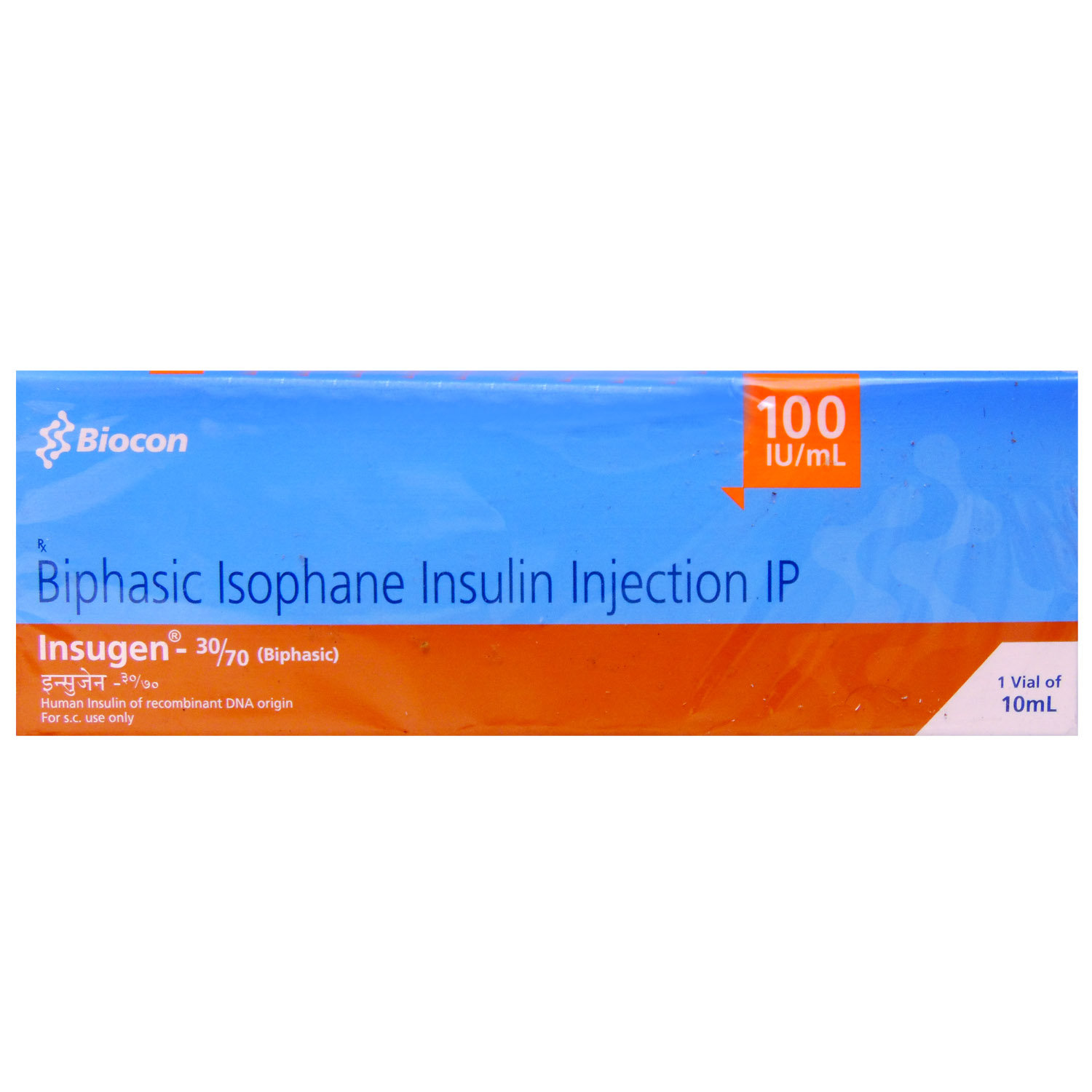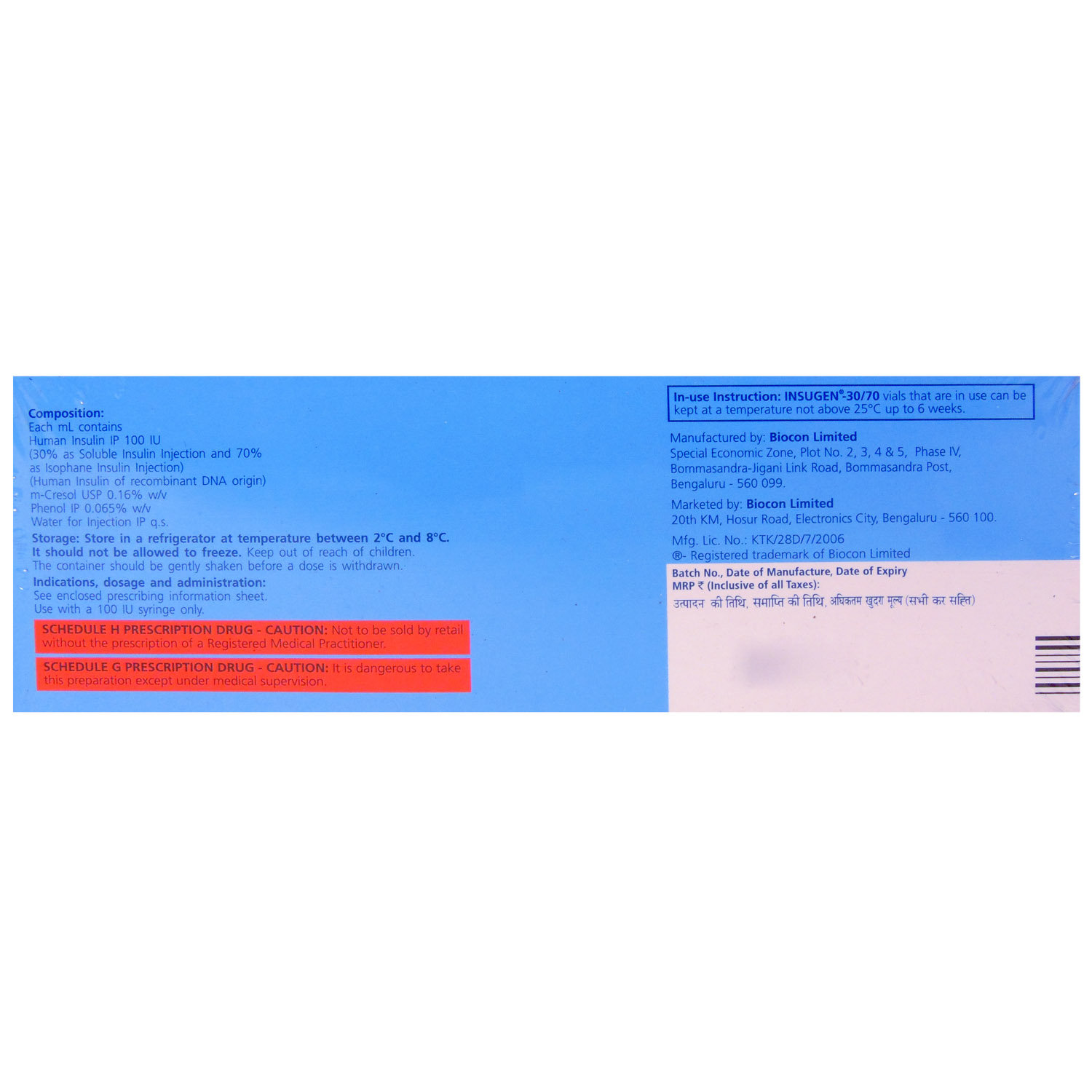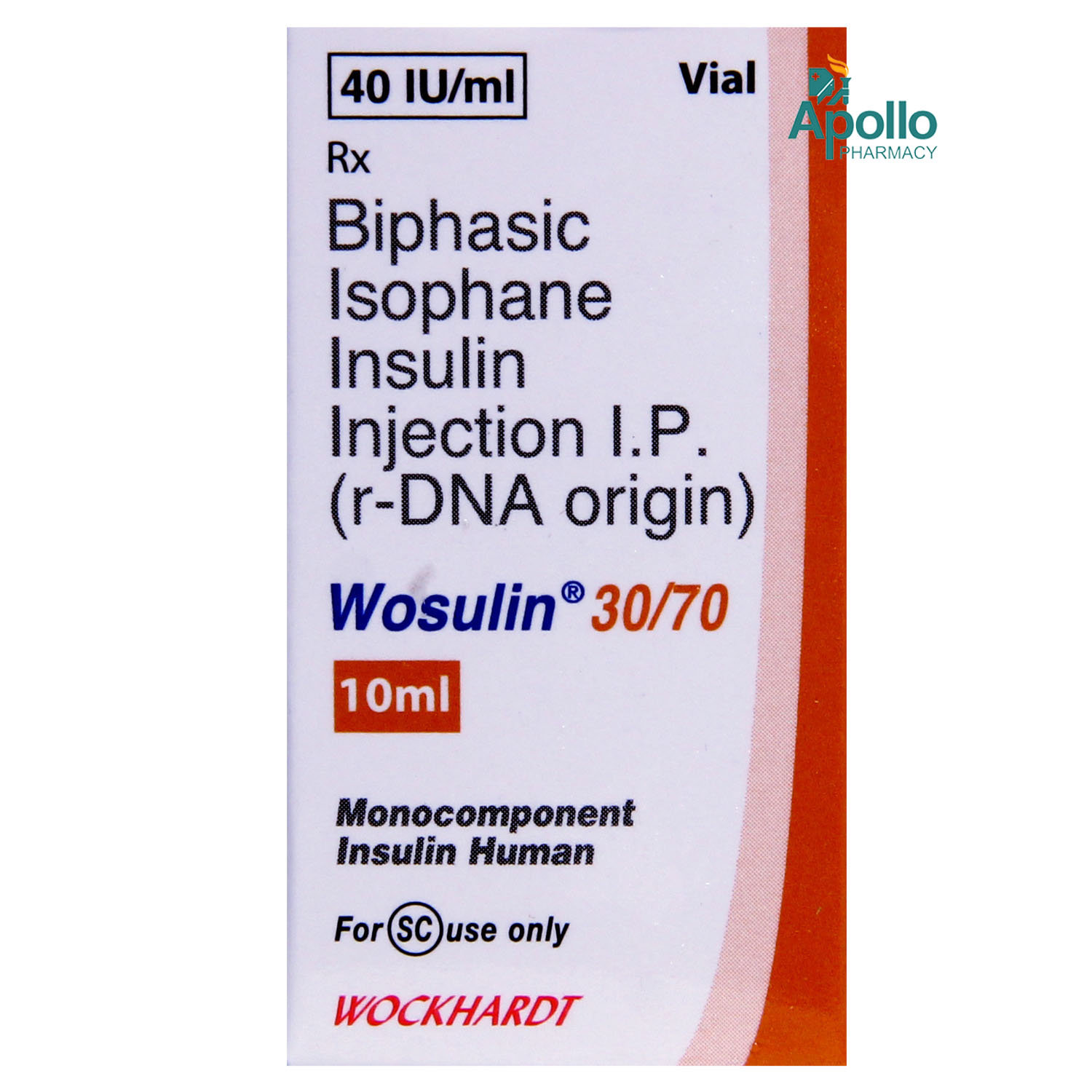Insugen 30/70 Injection 100IU 10 ml
MRP ₹569
(Inclusive of all Taxes)
₹85.3 Cashback (15%)
Provide Delivery Location
Online payment accepted
 Prescription drug
Prescription drugWhats That
Composition :
Manufacturer/Marketer :
Consume Type :
Expires on or after :
Return Policy :
About Insugen 30/70 Injection 100IU
Insugen 30/70 Injection 100IU is a combination of two medicines, an intermediate-acting and a short-acting type of insulin, primarily used for the treatment of both type 1 and type 2 diabetes mellitus. It maintains blood sugar levels in adults and children. Diabetes mellitus is a condition that affects the way your body processes glucose. In Diabetes Mellitus Type 1, the body does not make enough insulin to control blood sugar levels. In Diabetes Mellitus type 2, either the body stops producing enough insulin (the hormone which helps to decrease sugar levels in the blood) or there is resistance to the action of insulin. As a result, insulin is produced in large amounts but it is not able to act on the organs of the body.
Insugen 30/70 Injection 100IU is a combination of two drugs one is insulin human (a short-acting type of insulin) and the other is insulin isophane (intermediate-acting). Insulin human is a hormone known as 'insulin' made in your pancreas, which helps your body utilize glucose (sugar) for energy. Insulin Isophane contains human insulin, used to improve blood sugar control in adults and children with type 1 and type 2 diabetes mellitus. It maintains blood sugar levels in both adults and children. Insugen 30/70 Injection 100IU helps to lower the blood sugar (glucose) level by facilitating the uptake of glucose. It is followed by the binding of insulin to the cells of muscle and fat cells thereby inhibiting glucose release from the liver. Thus, together Insugen 30/70 Injection 100IU helps to decrease blood glucose levels after the intake of meals. Besides this, it also prevents the chances of developing serious complications of diabetes like damage of retina (retinopathy), damage of kidney (nephropathy), damage of nerve cells (neuropathy), diabetic foot ulcer, and others.
Take Insugen 30/70 Injection 100IU as prescribed by your doctor. You are advised to take Insugen 30/70 Injection 100IU for as long as your doctor has prescribed it for you depending on your medical conditions. You may experience an allergic reaction at the site of injection, hypoglycemia (low blood glucose level), itching, lipodystrophy (skin thickening or pits at the injection site), edema (swelling), rashes, and weight gain. Most of these side effects of Insugen 30/70 Injection 100IU do not require medical attention and gradually resolve over time. However, if the side effects are persistent, reach out to your doctor.
In type 1 diabetes, untreated high blood sugar levels can lead to a life-threatening condition known as diabetic ketoacidosis. Try not to stop taking this medicine of your own. Let your doctor know about this, as it may cause withdrawal symptoms. Do not take this medicine if you have any low blood glucose levels, kidney, liver, or heart problems, or problems with alcohol or other prescription recreational drugs. Along with this medicine, you should take a healthy diet, do regular exercise, and maintain weight as advised by your doctor. Insugen 30/70 Injection 100IU is a cold chain medicine and so it has to be stored in the refrigerator between 2-8 degrees Celsius else its efficiency may be lost. Do not store in the freezer of the refrigerator.
Uses of Insugen 30/70 Injection 100IU
Directions for Use
Key Benefits
When you take Insugen 30/70 Injection 100IU, it works by ensuring rapid and consistent sugar control. It facilitates the reuptake of sugar in muscle and fat cells and also suppresses the production of sugar in the liver. It prevents the chances of developing serious complications of diabetes. Besides this, Insugen 30/70 Injection 100IU can be safely prescribed to the diabetic mother in the pregnancy as well as the lactation stage. Insugen 30/70 Injection 100IU helps in improving glycaemic control which in turn decreases the risk of progression of complications of diabetes like damage to the retina (retinopathy), damage of kidney (nephropathy), damage of nerve cells (neuropathy), delayed wound healing, diabetic foot ulcer, and others.
Storage
- If you experience low blood sugar levels, inform your doctor. They will assess the severity and make recommendations for the next actions.
- Your doctor will assess your symptoms, blood sugar levels, and overall health before recommending the best course of action, which may include treatment, lifestyle modifications, or prescription adjustments.
- Follow your doctor's instructions carefully to manage the episode and adjust your treatment plan.
- Make medication adjustments as recommended by your doctor to prevent future episodes.
- Implement diet and lifestyle modifications as your doctor advises to manage low blood sugar levels.
- Monitor your blood sugar levels closely for patterns and changes.
- Track your progress by recording your blood sugar levels, food intake, and physical activity.
- Seek further guidance from your doctor if symptoms persist or worsen so that your treatment plan can be revised.
- If you experience signs of skin allergies such as redness, itching, or irritation after taking medication, contact your doctor right away.
- To alleviate skin allergy symptoms, your doctor may change your medication regimen or offer tailored medication management advice.
- Your doctor may recommend or prescribe drugs to relieve discomfort.
- Cool compresses or calamine lotion can help relieve redness and itching on the afflicted skin area.
- Staying hydrated by consuming plenty of water can help relieve discomfort.
- Monitor your skin condition closely and promptly report any changes, worsening symptoms, or concerns to your healthcare provider.
- Skin rash caused by allergies is due to irritants or allergens. Therefore, avoid contact with such irritants.
- Consult your doctor for proper medication and apply an anti-itch medication. Follow the schedule and use the medication whenever needed.
- Protect your skin from extreme heat and try to apply wet compresses.
- Soak in the cool bath, which gives a soothing impact to the affected area.
Drug Warnings
Insugen 30/70 Injection 100IU is for subcutaneous use only and should never be administered intravenously (IV) or in the veins. If you are changing the brand of insulin, it should be done under strict medical supervision. Cases of heart failure have been reported when pioglitazone was used with insulin especially in patients who are at high risk of cardiac heart failure. The first symptoms of hyperglycemia (high blood sugar level) may include symptoms like excessive thirst, dry mouth, increased frequency of urination, nausea, vomiting, drowsiness, flushed dry skin, loss of appetite, and acetone odor of the breath. You should closely monitor these symptoms. Symptoms like heart failure, weight gain, and edema (fluid deposition in tissue) should not be overruled. You are recommended not to consume alcohol as it may elevate blood glucose levels. Care should be taken when you are traveling across more than 2 time zones. Your doctor may adjust your insulin schedule. Insugen 30/70 Injection 100IU may decrease the level of potassium leading to a state of hypokalaemia that, if left untreated, may lead to respiratory paralysis, irregular heartbeat rhythm, coma, and even death. Do not take this medicine if you have any low blood glucose levels, kidney, liver, or heart problems, or problems with alcohol or other prescription recreational drugs.
Drug-Drug Interactions
Drug-Drug Interactions
Login/Sign Up
Coadministration of Gatifloxacin with Insugen 30/70 Injection 100IU 10 ml may sometimes affect blood glucose levels. Both low blood glucose and, less frequently, high blood glucose have been reported.
How to manage the interaction:
Although there is a possible interaction, Insugen 30/70 Injection 100IU 10 ml can be taken with Gatifloxacin if prescribed by the doctor. Consult the prescriber if you experience symptoms such as nervousness, confusion, headache, dizziness, drowsiness, tremors, nausea, hunger, weakness, perspiration, palpitation, rapid heartbeat, increased urination, increased thirst, and increased hunger. Maintaining blood glucose levels is advised.
Taking Insugen 30/70 Injection 100IU 10 ml with ciprofloxacin effects blood glucose levels, which may cause hyperglycemia (high blood sugar) or hypoglycemia (low blood sugar) less frequently.
How to manage the interaction:
Although taking ciprofloxacin and Insugen 30/70 Injection 100IU 10 ml together can possibly result in an interaction, it can be taken if your doctor has prescribed it. However, consult a doctor if you experience headaches, dizziness, sleepiness, anxiety, disorientation, tremors, nausea, hunger, weakness, increased sweating, and a rapid heartbeat, increased hunger, increased thirst. Do not discontinue any medications without consulting a doctor.
Taking Insugen 30/70 Injection 100IU 10 ml with trovafloxacin affects blood glucose levels, which may cause hyperglycemia (high blood sugar) and hypoglycemia (low blood sugar) less frequently.
How to manage the interaction:
Although taking trovafloxacin and Insugen 30/70 Injection 100IU 10 ml together can possibly result in an interaction, it can be taken if your doctor has prescribed it. However, consult the doctor immediately if you experience hypoglycemia or hyperglycemia. Symptoms of hypoglycemia include headache, dizziness, drowsiness, nervousness, confusion, shaking, nausea, loss of hunger, weakness, sweating, palpitations, and rapid heartbeat. Symptoms of hyperglycemia may include increased thirst, increased hunger, and increased urination. Do not stop using any medications without first talking to your doctor.
Taking Insugen 30/70 Injection 100IU 10 ml with cinoxacin affects blood glucose levels, which may cause hyperglycemia (high blood sugar) and hypoglycemia (low blood sugar) less frequently.
How to manage the interaction:
Although taking Cinoxacin and Insugen 30/70 Injection 100IU 10 ml together can possibly result in an interaction, it can be taken if your doctor has prescribed it. However, consult the doctor immediately if you experience hypoglycemia or hyperglycemia. Symptoms of hypoglycemia include headache, dizziness, drowsiness, nervousness, confusion, shaking, nausea, loss of hunger, weakness, sweating, palpitations, and rapid heartbeat. Symptoms of hyperglycemia may include increased thirst, increased hunger, and increased urination. Do not stop using any medications without first talking to your doctor.
Taking Insugen 30/70 Injection 100IU 10 ml with ciprofloxacin effects blood glucose levels, which may cause hyperglycemia (high blood sugar) and hypoglycemia (low blood sugar) less frequently..
How to manage the interaction:
Although taking ciprofloxacin and Insugen 30/70 Injection 100IU 10 ml together can possibly result in an interaction, it can be taken if your doctor has prescribed it. However, consult the doctor immediately if you experience headache, dizziness, drowsiness, nervousness, confusion, shaking, nausea, loss of hunger, weakness, sweating, and rapid heartbeat, increased thirst, increased hunger, and increased urination. Do not stop using any medications without talking to a doctor.
Taking Insugen 30/70 Injection 100IU 10 ml with gemifloxacin affects blood glucose levels, which may cause hyperglycemia (high blood sugar) and hypoglycemia (low blood sugar) less frequently.
How to manage the interaction:
Although taking Gemifloxacin and Insugen 30/70 Injection 100IU 10 ml together can possibly result in an interaction, it can be taken if your doctor has prescribed it. However, consult the doctor immediately if you experience hypoglycemia or hyperglycemia. Symptoms of hypoglycemia include headache, dizziness, drowsiness, nervousness, confusion, shaking, nausea, loss of hunger, weakness, sweating, palpitations, and rapid heartbeat. Symptoms of hyperglycemia may include increased thirst, increased hunger, and increased urination. Do not stop using any medications without first talking to your doctor.
Taking Insugen 30/70 Injection 100IU 10 ml with enoxacin affects blood glucose levels, which may cause hyperglycemia (high blood sugar) and hypoglycemia (low blood sugar) less frequently.
How to manage the interaction:
Although taking Enoxacin and Insugen 30/70 Injection 100IU 10 ml together can possibly result in an interaction, it can be taken if your doctor has prescribed it. However, consult the doctor immediately if you experience hypoglycemia or hyperglycemia. Symptoms of hypoglycemia include headache, dizziness, drowsiness, nervousness, confusion, shaking, nausea, loss of hunger, weakness, sweating, palpitations, and rapid heartbeat. Symptoms of hyperglycemia may include increased thirst, increased hunger, and increased urination. Do not stop using any medications without first talking to your doctor.
Taking Insugen 30/70 Injection 100IU 10 ml with nalidixic acid affects blood glucose levels, which may cause hyperglycemia (high blood sugar) and hypoglycemia (low blood sugar) less frequently.
How to manage the interaction:
Although taking Nalidixic acid and Insugen 30/70 Injection 100IU 10 ml together can possibly result in an interaction, it can be taken if your doctor has prescribed it. However, consult the doctor immediately if you experience hypoglycemia or hyperglycemia. Symptoms of hypoglycemia include headache, dizziness, drowsiness, nervousness, confusion, shaking, nausea, loss of hunger, weakness, sweating, palpitations, and rapid heartbeat. Symptoms of hyperglycemia may include increased thirst, increased hunger, and increased urination. Do not stop using any medications without first talking to your doctor.
Drug-Food Interactions
Drug-Food Interactions
Login/Sign Up
Diet & Lifestyle Advise
- Exercise may lower your body’s need for insulin during and for some time after the physical activity.
- Exercise may also speed up the effect of an insulin dose, especially if the exercise involves the area of the injection site (for example, the leg should not be used for injection just prior to running).
- Avoid eating sugar food and prefer food cooked food low in calories.
- While traveling across more than 2 time zones, you should talk to your doctor concerning adjustments in your insulin schedule.
Side Effects of Insugen 30/70 Injection 100IU
- Allergic reaction at the site of injection
- Hypoglycemia (low blood glucose level)
- Itching
- Lipodystrophy (skin thickening or pits at the injection site)
- Edema (swelling)
- Rashes
- Weight gain
Habit Forming
Therapeutic Class
All Substitutes & Brand Comparisons
RX
Wosulin 30/70 40IU/ml Injection 10 ml
Wockhardt Ltd
₹178
(₹16.02/ 1ml)
71% CHEAPERRX
Out of StockINSUCARE M 30 (30/70)40UI INJECTION
₹140.7
(₹126.63 per unit)
122% COSTLIERRX
Mixtard 30 Flexpen 100/ml Injection 3 ml
Novo Nordisk India Pvt Ltd
₹626.5
(₹208.83/ 1ml)
267% COSTLIER
Drug-Diseases Interactions
Drug-Diseases Interactions
Login/Sign Up
FAQs
Insulin kept out of the refrigerator will not poison you or even make you sick. It just means that your Insugen 30/70 Injection 100IU will not work as well or deliver its full potential dose. In simple terms, if your blood sugar is high, and you use the insulin that has been kept out, your blood sugar may not be lowered. In short efficacy of Insugen 30/70 Injection 100IU will be decreased if not kept in the refrigerator between 2-8 degrees Celsius.
If Insugen 30/70 Injection 100IU is taken in more than the recommended doses, it can cause mild to severe hypoglycemic episodes.
Symptoms of high blood sugar include increased thirst, frequent urination, fatigue, vomiting, shortness of breath, nausea, stomach pain, dry mouth, fruity breath odor, and a fast heartbeat.
Insugen 30/70 Injection 100IU is to be injected subcutaneously (under the skin). The best areas to give Insugen 30/70 Injection 100IU are your upper thigh, stomach, upper arm, or buttocks.
Drug-Drug Interactions Checker List
- PHENELZINE
- ISOCARBOXAZID
- IMIPRAMINE
- DESIPRAMINE
- TRANYLCYPROMINE
- MOCLOBEMIDE
- SELEGILINE
- LINEZOLID
- LITHIUM
- SUMATRIPTAN
- TRAMADOL
- CIMETIDINE
- LANSOPRAZOLE
- OMEPRAZOLE
- FLUCONAZOLE
- TICLOPIDINE
- WARFARIN
- MEFLOQUINE
Special Advise
If you feel any symptoms of Hypoglycemia (fatigue, dizziness ,Confusion, heart palpitations, shakiness and anxiety), consult your doctor immediately.
Disease/Condition Glossary
In type 1 diabetes mellitus our body does not make insulin (the hormone which helps to decrease sugar levels in the blood) to control blood sugar levels.
In type 2 diabetes mellitus, either the body stops producing enough insulin or there is resistance to the action of insulin. As a result, insulin is produced in sufficient amounts but is unable to act on the tissues of the organs.

Have a query?
Alcohol
Safe if prescribed
You are recommended not to consume alcohol along with Insugen 30/70 Injection 100IU to avoid unpleasant side-effects. Alcohol may intensify and prolong the hypoglycemic effect of insulin.
Pregnancy
Consult your doctor
Please inform your doctor if you are pregnant as a dose adjustment may be required. The amount of insulin you need usually falls during the first three months of pregnancy and increases for the remaining six months
Breast Feeding
Consult your doctor
Please inform your doctor if you are breastfeeding as a dose adjustment may be required. You may be advised to alter your insulin intake or to modify your diet.
Driving
Safe if prescribed
Drive with caution, Insugen 30/70 Injection 100IU usually causes drowsiness and affects driving ability. Your ability to concentrate and react may be reduced if you have hypoglycemia (low blood sugar).
Liver
Consult your doctor
Insugen 30/70 Injection 100IU to be taken with caution, especially if you have a history of liver diseases/conditions. The dose may have to be adjusted by your doctor.
Kidney
Consult your doctor
Insugen 30/70 Injection 100IU to be taken with caution, especially if you have a history of kidney diseases/conditions. The dose may have to be adjusted by your doctor.
Children
Safe if prescribed
Insugen 30/70 Injection 100IU can be given safely to children provided the dose has been prescribed by a child specialist.










